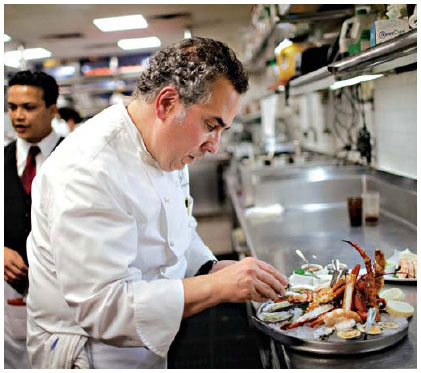Tips and Articles
On Wall Street, a return to exuberance
Updated: 2010-12-06 10:11
By Susanne Craig and Kevin Roose (China Daily)
 |
|
Confidence, and conspicuous consumption, are rebounding among New York’s financial elite. Guests at the Whitney Museum gala in October. [Photo/Michael Nagle/The New York Times] |
|
|
|
Bookings are up at expensive restaurants. Michael Lomonaco, the head chef at the Porter House in Manhattan, is seeing more business. [Photo/Marcus Yam/The New York Times] |
Two years after the onset of the financial crisis, the stock market is recovering and its moneyed elite are spending again - at times cautiously, but sometimes with a familiar swagger.
It's true that firms scaled back the corporate excesses for which they were vilified as a brutal recession gripped America and much of the world. Many of those constraints remain in place.
But when it comes to personal indulgences, the wallets are beginning to open up. Traders and executives say that jobs seem much more secure. Businesses whose fortunes ebb and flow with the financial markets are thriving again.
"Wall Street is back spending as much if not more than before," said Dr. Francesca J. Fusco, a New York dermatologist whose business is booming.
Christie's auction house says investors from the financial world who fell out of the bidding market during the 2008 credit crisis are "pouring" back in.
Marc B. Porter, a senior executive at Christie's, said this resurgence has followed the recovery of different economies, be it Hong Kong or the United States.
Expensive restaurants report a pickup in bookings, and real estate agents say Wall Street executives have already begun lining up summer rentals in the Hamptons, an exclusive seaside resort east of New York.
Dolly Lenz of Prudential Douglas Elliman said the bidding was "hotter and heavier" than previous years. Just recently,she said, three people bid more than $400,000 for a summer rental in Southampton.
Compensation on Wall Street this year will not be much higher than 2009, and may even be lower.
So the change in attitude appears more a matter of confidence and security than income.
"The mood is absolutely better, much better than even a year ago," says David M. Gildea, a health care trader at the Wall Street firm Cowen & Company.
In 2008, he said, he and other traders were reluctant to even go out for a drink after work, uncertain if they would keep their jobs.
Now, Mr. Gildea said, "there is a definite buzz on the Street that hasn't been there in some time."
J.T. Cacciabaudo, head of equity trading and sales trading at the regional brokerage firm Sterne Agee, agrees, saying while there is some concern in the market about the fourth quarter, optimism about the longer term "has come back" and firms like his are in growth mode.
"Going into the third quarter, there was chatter about layoffs and most of that didn't come to fruition because firms seems more optimistic about 2011 than the past two years," he said.
Yet bonuses on Wall Street are not likely to be up much from last year. Over all, Goldman Sachs, Morgan Stanley, Citigroup, Bank of America and JPMorgan Chase have set aside $89.54 billion this year to pay employees, 2.8 percent less than a year ago, according to data from Nomura.
Total revenue for the five firms, meanwhile, has fallen about 4 percent this year. A study by the compensation expert Alan Johnson says that bonuses will be up 5 percent this year across all financial services companies, with employees in some businesses like asset management getting increases of 15 percent.
This is a big change from 2007, when some firms on Wall Street set records for compensation payouts.
In the years leading up to the credit crisis some executives became famous for their expenditures, like L. Dennis Kozlowski, the ex-chief executive of Tyco International whose $6,000 shower curtain became a symbol of unnecessary extravagance.
Some of that excess remains. A Morgan Stanley trader recently tried to hire a dwarf for a bachelor party in Miami, according to e-mail exchanges. The trader, who wanted to handcuff the dwarf to the bachelor, was recently fired.
Most expenditures, however, are for more mainstream indulgences. Deborah Killoran, a client of Dr. Fusco's, is scheduled for an ulthera, a nonsurgical face-lift that costs $3,000 and upward.
Ms. Killoran, who runs a Brooklyn-based insurance company, says that over the last two years she cut her annual spending on cosmetic surgery in half, to about $3,000. She is now spending at pre-2008 levels. "I have to meet a lot of people, and this is part of investing in myself," she said.
The New York Times
Specials

President Hu visits the US
President Hu Jintao is on a state visit to the US from Jan 18 to 21.

Ancient life
The discovery of the fossile of a female pterosaur nicknamed as Mrs T and her un-laid egg are shedding new light on ancient mysteries.

Economic Figures
China's GDP growth jumped 10.3 percent year-on-year in 2010, boosted by a faster-than-expected 9.8 percent expansion in the fourth quarter.
